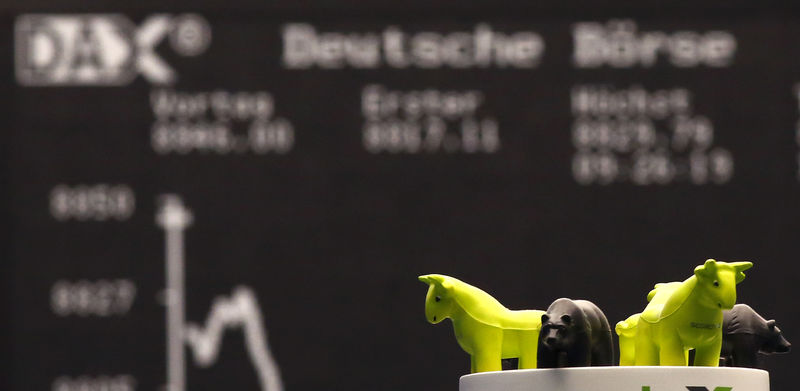This post was originally published on this site
https://i-invdn-com.investing.com/news/LYNXNPEEAC0LE_M.jpg
Investing.com – European stock markets weakened Wednesday, as investors warily await the release of the latest U.S. inflation report which could guide future Federal Reserve policy.
By 4 AM ET (0800 GMT), the DAX in Germany traded 1.2% lower, the CAC 40 in France fell 0.9%, and the U.K.’s FTSE 100 dropped 0.9%.
Investors have been on edge this week as they prepare for the release of the June consumer price index out of the U.S. later Wednesday.
This is expected to show annual headline inflation, including food and energy, rising above May’s 8.6% level to 8.8%, a 40-year peak.
Such an elevated figure is likely to persuade the U.S. central bank of the need to continue with aggressive interest rate rises, on top of the hike of 75 basis points at its last meeting, even if this runs the risk of pushing the U.S. economy, the main global growth driver, into recession.
Back in Europe, there was some good news as the British economy grew surprisingly strongly in May, with gross domestic product rising by 0.5%, the best performance in five months, thanks to a 1.4% increase in construction output and solid rises in industrial and manufacturing output.
In corporate news, J D Wetherspoon (LON:JDW) stock fell 5.2% after the U.K. pub chain warned that it will report a higher than expected full-year loss, citing a spike in labor costs that offset a recovery in sales to near pre-pandemic levels.
Credit Suisse (SIX:CSGN) stock fell 2.6% after the Swiss lender postponed the initial public offering of its 1a Immo PK real estate fund, citing current market turbulence.
SAS (ST:SAS) stock rose over 13% after the Scandinavian airline and unions representing pilots on strike will resume talks on Wednesday in an attempt to end the dispute which started on July 4.
Oil prices edged higher Wednesday, clawing back some of the previous session’s losses, as traders warily awaited the U.S. inflation data which could prompt further U.S. rate hikes, weakening global activity.
U.S. crude stocks rose by about 4.8 million barrels for the week ended July 8, according to Tuesday’s data from the industry body American Petroleum Institute, exacerbating fears of a wobble in oil demand.
The official government inventory report is due later Wednesday.
By 4 AM ET, U.S. crude futures traded 0.8% higher at $96.58 a barrel, while the Brent contract traded 0.7% higher at $100.22. Both contracts fell by more than 7% on Tuesday, falling through $100 a barrel for the first time since April.
Additionally, gold futures rose 0.1% to $1,725.45/oz, while EUR/USD traded 0.1% lower at 1.0027.

